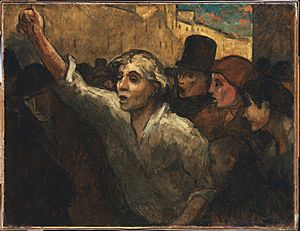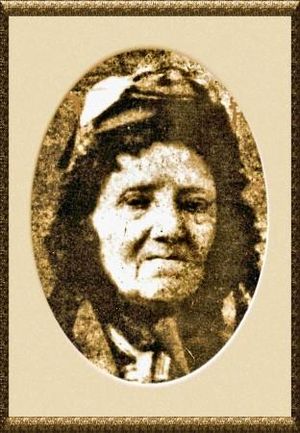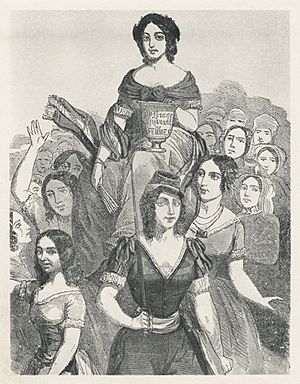Jeanne Deroin facts for kids
Jeanne Deroin (born December 31, 1805 – died April 2, 1894) was a French woman who believed strongly in equal rights for women and a fairer society for everyone. She is known as a socialist feminist. She spent the last half of her life living in London, where she kept working for her causes.
Early Life and Beliefs
Jeanne Deroin was born in Paris. She started her career as a seamstress, making clothes. In 1831, she joined a group called the Saint-Simonites. These were followers of Henri de Saint-Simon, who was a utopian socialist. This means he dreamed of a perfect society where everyone worked together fairly.
Jeanne wrote a long essay for the group. In it, she argued that women were not less important than men. She also compared marriage at the time to slavery, because women had so few rights. Even so, in 1832, she married Antoine Ulysse Desroches, who was also a Saint-Simonite. But she refused to take his last name. She also insisted on making a promise of equality during their civil ceremony (a marriage done by the government, not a church).
Later in 1832, Jeanne and other working women left the Saint-Simonites. They felt the group was too strict and religious. They then supported another socialist named Charles Fourier. They started publishing La Femme Libre (The Free Woman). This was the first newspaper in France made for women. Jeanne wrote for it using the pen name Jeanne Victoire.
During this time, Jeanne also became a qualified schoolteacher. From 1834, she focused on teaching and raising her own children, as well as those of Flora Tristan.
Fighting for Change in 1848

Jeanne Deroin was a very important person during the Revolutions of 1848 in France. She campaigned for women's rights. She also spoke out against children being exploited (used unfairly for work) and against harsh treatment of prisoners.
With other women who followed Fourier, like Pauline Roland and Eugenie Niboyet, she started a socialist feminist newspaper and club. It was called Voix des Femmes (Voice of Women). She strongly called for women's suffrage, which means the right for women to vote. The group had to close down quickly. But Jeanne worked with Desirée Gay to create the Association Mutuelle des Femmes and the Politique des Femmes (Politics of Women) newspaper. This group offered free classes to working women.
Politique des Femmes soon faced a problem. The government required a large sum of money (a 5,000 franc security bond) to publish. Jeanne replaced it with Opinion des Femmes (Opinion of Women), but this newspaper only lasted for one issue.
In January 1849, Jeanne relaunched Opinion des Femmes. She kept campaigning, especially against the anarchist philosopher Pierre-Joseph Proudhon. An anarchists is someone who believes in no government. Jeanne Deroin ran for election in Paris in 1849. She became the first woman in France to run in a national election. She only received fifteen votes. This was partly because she would not have been allowed to take a seat in the government even if she won.
She then became the Deputy President of a group called the Société Populaire pour la Progression et la Réalisation de la Science Sociale. This group worked for a peaceful social revolution.
In the last issue of Opinion des Femmes in August 1849, Jeanne called for a new group. It was called the Association Fraternelle et Solidaire de Toutes les Associations. She saw this as a way to turn small co-operative groups into a big, powerful union. This union could organize work, get rid of wages, and control the economy.
The government gave Jeanne and Desirée Gay money to start an association of women seamstresses. A simpler version of Jeanne's big union idea did manage to connect over one hundred existing groups. Jeanne was elected to its Central Committee. However, the government slowly stopped the Association. In May 1850, its offices were raided, and 46 members were arrested.
Prison and Life in Exile
Jeanne Deroin was put in prison until June 1851. She used this time to keep campaigning for women's rights. She wrote letters to groups in other countries, like the National Women's Rights Convention in Massachusetts. She gave them advice on how to fight for their cause.
After she was released, she went back to teaching. But in 1852, she feared being arrested again. So, she moved to London with her two youngest children. She lived in Shepherd's Bush, where she taught and did embroidery work. She also published three women's almanacs (books with calendars and facts). She stayed active in supporting workers' co-operatives, which are businesses owned and run by their workers.
In 1862, Jeanne Deroin started a boarding school for children of French exiles. She wanted to let even the poorest children attend. But the school did not make enough money to continue. In 1871, the new French government gave her a small pension (regular payment). Even though she stayed in London, she kept writing to socialist feminists and women's suffrage campaigners in France. These included people like Léon Richer and Hubertine Auclert.
In the 1880s, Jeanne joined the Socialist League in the UK. When she died, its founder, William Morris, gave a speech at her funeral.
See also
 In Spanish: Jeanne Deroin para niños
In Spanish: Jeanne Deroin para niños



